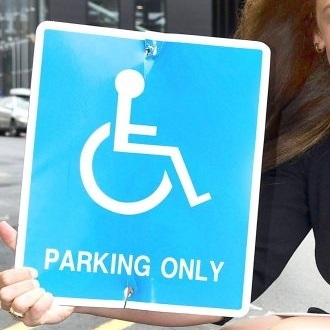When mobility is an issue, anything that makes it easier to get around, or reduces the distance to travel once you leave your car, is important. It’s not just frustrating or inconvenient for mobility permit holders when someone else steals their spot; it can prevent them from accessing businesses and services in our city. Unfortunately, illegal parking in mobility spaces is all too common throughout New Zealand.
We developed our mobility parking solution in partnership with CCS Disability Action. When complete, the full solution will include an app to help mobility permit holders find available parking spaces and report mobility parking abuse, as well as sensors on parking spaces with automatic parking validation to confirm that a vehicle is legally parked.
How the system works
The ParkSense system is being developed by local company Pip IoT. It uses rugged, tamper-proof sensor units attached to the ground on each parking space, and a Bluetooth tile on the back of each valid mobility permit. When the sensor detects a parked vehicle, it checks for a valid Bluetooth tile. The sensors send their data back to a central dashboard that is accessed by the local parking team.
The AccessAware app was developed by Wellington developer Thundermaps. It shows mobility parks on a map, and shows which ones are currently free. App users can improve the map data by uploading more parking space locations, photos, and helpful details like hazards near a parking space. App users can also report damaged or inaccessible spaces, or report mobility parking abuse.
The focus of this app is not on issuing infringement notices, but rather on gathering and displaying data so that we can understand how our mobility parks are being used (and sometimes abused) by the community.
The real-time data from the mobility parking solution gives CCS Disability Action, city planners, and the parking team full visibility of the extent and nature of mobility park use and abuse. Using this data, CCS Disability Action and Council can work with the local community to implement strategies that mitigate problems.
Mobility parking solution trial
The AccessAware app was released in October 2017. In February 2018, ParkSense sensors were installed on selected mobility parking spaces in the central city. The next phase to be implemented is an effective mechanism for permit validation, using Bluetooth tiles issued to a small group of mobility permit holders.
Expected outcomes
- Provides accurate and detailed reporting on mobility parking use and abuse.
- Provides better data on which parking spaces work well and which ones have challenges for our mobility parking community, so that the Council can plan mobility parking more effectively, and make improvements to existing parks wherever possible.
- Empirical data on mobility parking use and abuse, combined with a public information campaign, will provide a great opportunity for a change in behaviour from Christchurch citizens.
- Visible parking sensors will act as a deterrent for drivers considering using parking spaces illegally.
- Gives permit holders better information on available parking, and enables them to contribute to the improvement of our infrastrucutre.
- Mobility permit holders will have an effective channel, backed up by empirical data, to highlight what infrastructure works well, and what needs to be improved to create a better experience for all citizens of Christchurch.
What’s next?
The next phase of the trial is testing the permit validation solution. We plan to extend the trial to mobility parking at the Christchurch Public Hospital, and then evaluate the success of the trial with all stakeholders.



